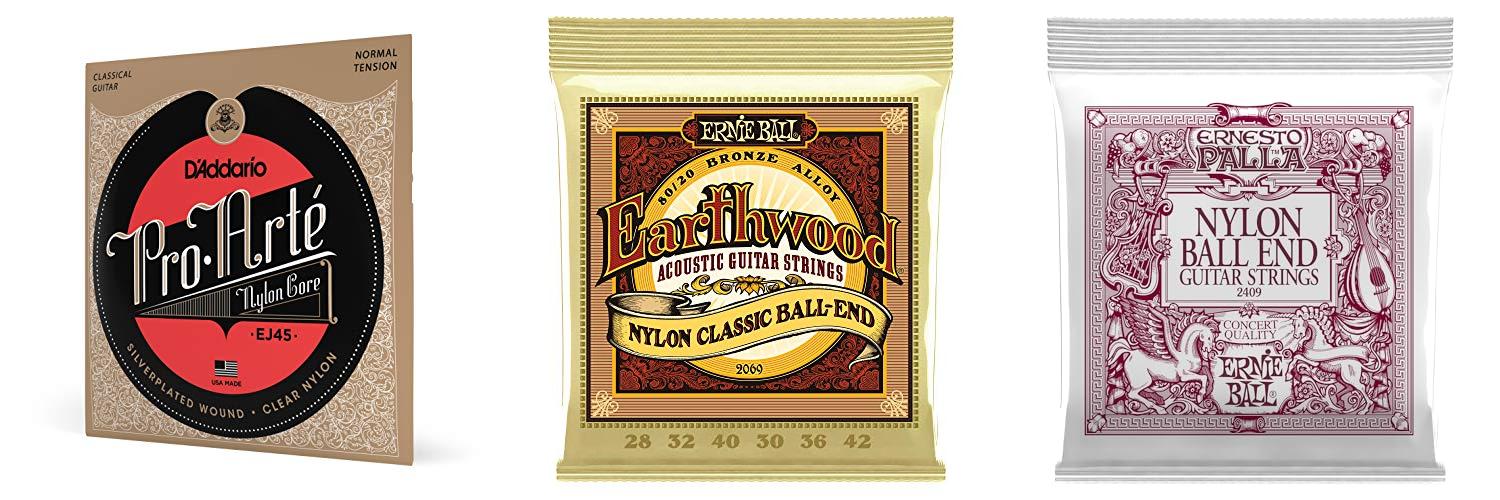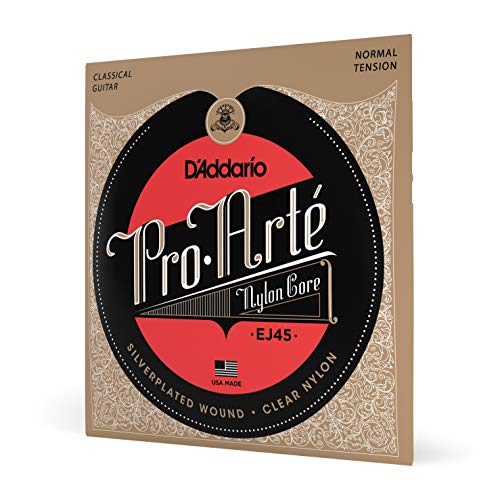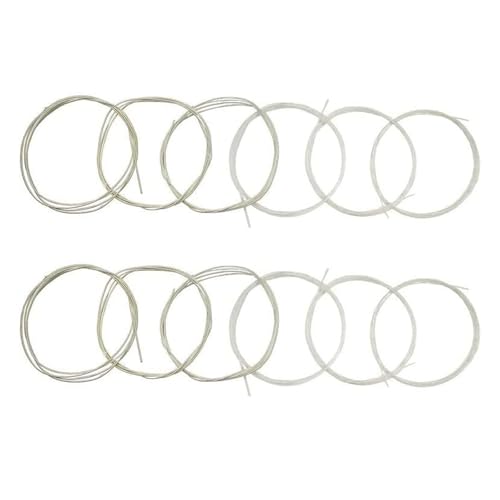Ever heard that beautiful, warm sound coming from a classical guitar and wondered what makes it so special? It’s often the strings! But choosing the right nylon guitar strings can feel like a puzzle. So many brands and types exist, it’s easy to get confused and pick strings that don’t sound quite right for your playing style or your guitar.
This can lead to frustration. Maybe your notes don’t ring out clearly, or the strings feel too stiff or too loose under your fingers. You want your guitar to sing, not struggle. That’s where this guide comes in! We’re going to break down everything you need to know about nylon guitar strings so you can finally find the perfect match.
By the end of this post, you’ll understand the different types of nylon strings, what makes them sound unique, and how to pick the best ones for you. Get ready to unlock a richer, more enjoyable playing experience as we dive into the wonderful world of nylon strings.
Our Top 5 Nylon Guitar Strings Recommendations at a Glance
Top 5 Nylon Guitar Strings Detailed Reviews
1. D’Addario Pro Arté Nylon Classical Guitar Strings
Rating: 9.3/10
The D’Addario Pro Arté Nylon Classical Guitar Strings, EJ45, Normal Tension, 6-String Set, Pack of 1, deliver the classic sound that many classical guitarists love. These strings are designed for a comfortable playing experience and a warm, sweet tone.
What We Like:
- They offer the standard classical guitar tone that players expect.
- The strings feel good to play and have a lovely, mellow sound.
- They are made with a multi-filament nylon core for the bass strings and clear nylon for the treble strings.
- The set includes tie-ends.
- You can earn reward points by registering a code from the bag.
- These strings are made in the USA.
What Could Be Improved:
- The normal tension might not be ideal for players who prefer very light or very heavy strings.
- While the tone is classic, some advanced players might seek more complex or unique tonal qualities.
Overall, the D’Addario Pro Arté Nylon Classical Guitar Strings are a solid choice for any classical guitarist seeking reliable tone and playability. They provide a great foundation for practice and performance.
2. Ernie Ball Folk Nylon Clear & Gold Ball-End 80/20 Bronze Acoustic Guitar Strings
Rating: 8.8/10
Get ready to make beautiful music with the Ernie Ball Folk Nylon Clear & Gold Ball-End 80/20 Bronze Acoustic Guitar Strings. These strings are designed to give your acoustic guitar a warm and bright sound. They feature a nylon core for comfort and an 80/20 bronze wrap that adds a lively sparkle to your playing. Plus, they have ball-ends, making them super easy to put on your guitar.
What We Like:
- These strings feel smooth and comfortable under your fingers, making them great for long practice sessions.
- They create a full and lively tone that sounds fantastic on acoustic guitars.
- The ball-ends make changing your strings a breeze, even if you’re new to guitar.
- The combination of clear nylon and gold bronze wrap gives them a cool look.
What Could Be Improved:
- The lighter gauges (.028, .030) might not be the best choice for players who prefer a heavier feel or a very deep bass sound.
- While they offer a lively tone, some players might want even more sustain or a richer harmonic complexity from their strings.
These Ernie Ball strings are a solid choice for any acoustic guitarist looking for comfortable playability and a bright, engaging sound. They offer a good balance of tone and ease of use.
3. Ernie Ball 2409 Ernesto Palla Nylon Black and Gold Classical Ball End Set
Rating: 9.4/10
The Ernie Ball 2409 Ernesto Palla Nylon Black and Gold Classical Ball End Set is a fantastic choice for classical guitarists. These strings bring a unique look and feel to your instrument. The black nylon trebles add a touch of flair, while the 80/20 bronze basses create a bright, clear sound. They are designed for medium tension, making them comfortable to play. Plus, the ball-ends make them super easy to put on your guitar.
What We Like:
- The black and gold colors look really cool.
- The 80/20 bronze basses give a bright, punchy sound.
- Ball-ends make installing them a breeze.
- Medium tension feels comfortable for long playing sessions.
- They are made by Ernie Ball, a trusted name in guitar strings.
What Could Be Improved:
- Some players might prefer a different gauge for a specific sound.
- The black nylon could potentially show wear faster than traditional clear nylon over time, though this is not a significant issue.
Overall, this string set offers a great combination of style, sound, and ease of use. You’ll enjoy the bright tone and the simple installation process.
4. D’Addario Student Nylon Classical Guitar Strings
Rating: 9.1/10
Embarking on your guitar journey? The D’Addario Student Nylon Classical Guitar Strings, EJ27N-3D, Normal Tension, 6-String Set, Pack of 3 are your perfect first step. These strings are made just for new players. They give you a nice sound that’s not too bright or too dull, making them ideal for learning.
What We Like:
- These are our top choice for beginner classical guitar strings.
- They sound great for students because they have a good mix of warm and clear tones.
- The strings have tie ends, which makes them easy to put on your guitar.
- You can earn points for future D’Addario purchases by scanning a code on the bag.
- They are made right here in the USA with high quality standards.
What Could Be Improved:
- While great for beginners, more experienced players might want a string with a more complex tonal range.
- The normal tension might feel a little too loose for some players who prefer a stiffer feel.
For anyone starting out on a nylon-string classical guitar, this 3-pack is an excellent value. You get reliable strings that sound good and help you learn.
5. TUOREN 2 Sets of 6 String Classical Guitar Strings
Rating: 9.0/10
Looking for new strings for your classical guitar? The TUOREN 2 Sets of 6 String Classical Guitar Strings offer a great option for both beginners and experienced players. These strings are designed to give your guitar a warm, bright, and balanced sound. They come in a light gauge, which is usually easier for new players to press down. You get two sets, so you’ll have a spare ready. The clear nylon and silver winding create a nice look and feel.
What We Like:
- Provides a warm, bright, and well-balanced classical tone.
- The silver wire winding technology makes the strings stable and perform well.
- Clear nylon for the top three strings and silver-plated copper alloy wound for the bottom three strings offer a good mix of brightness and warmth.
- The light gauge (0.028 – 0.043) is comfortable for beginners to play.
- You get two sets, which is a good value for the price.
- They are about 100cm long, which is standard for most classical guitars.
What Could Be Improved:
- Some advanced players might prefer a heavier gauge for more volume.
- The silver winding might show wear over time, though this is common for many string types.
These TUOREN strings are a solid choice for anyone wanting to refresh their classical guitar’s sound. They offer good quality and value for musicians at any level.
Choosing the Right Nylon Guitar Strings: A Beginner’s Guide
Nylon guitar strings are a fantastic choice for many guitarists, especially beginners. They offer a softer feel and a warm, mellow tone. This guide will help you pick the perfect set for your needs.
Key Features to Look For
When you’re shopping for nylon strings, keep these features in mind:
- Tension: This is how tight the strings feel when you play. Lower tension strings are easier to press down, making them great for beginners and players with finger pain. Higher tension strings produce more volume and a brighter sound.
- Core Material: The core is the inner part of the string. Most nylon strings have a multi-filament nylon core.
- Winding: The basses (thicker strings) are usually wound with metal. The type of winding affects the sound and durability.
- Ball End vs. Tie-End: Most classical guitars use tie-end strings. Some acoustic guitars with nylon strings might have ball ends, similar to steel strings. Make sure you get the right type for your guitar.
Important Materials
The materials used in nylon strings are crucial to their sound and feel.
- Nylon: This is the most common material for the trebles (thinner strings). It gives a clear, bright tone. Some strings use rectified nylon, which is sanded to be more consistent.
- Silver-Plated Copper: This is a popular winding for the bass strings. It offers a warm, rich sound.
- Bronze: Some bass strings use bronze winding. This can give a slightly brighter and more projective sound than silver-plated copper.
- Titanium: This is a newer material for trebles. It’s smoother and can produce a brighter, more sustained tone than traditional nylon.
Factors That Improve or Reduce Quality
Several things can make nylon strings better or worse.
- Consistency: High-quality strings are made very consistently. This means each string has the same thickness and winding. Inconsistent strings can sound out of tune easily.
- Durability: Good strings last longer. They resist breaking and don’t wear out too quickly.
- Manufacturing Process: How the strings are made matters. Precise manufacturing leads to better sound and feel.
- Storage: Strings are often stored in sealed packages. This keeps them fresh. Old strings can sound dull.
User Experience and Use Cases
Nylon strings are used in many situations.
- Beginners: Nylon strings are perfect for people just starting to play guitar. They are gentle on fingers.
- Classical Guitars: These guitars almost always use nylon strings. They are designed for the warm sound nylon provides.
- Flamenco Guitars: These guitars often use slightly higher tension nylon strings for a punchier sound.
- Fingerstyle Players: Many fingerstyle guitarists prefer nylon strings for their rich tone and comfortable feel.
- Folk and World Music: Nylon strings fit well in many styles of music. They offer a softer sound.
Choosing the right nylon guitar strings can make a big difference in your playing experience. Consider the tension, materials, and how you plan to use them.
Frequently Asked Questions (FAQ)
Q: Are nylon guitar strings better for beginners?
A: Yes, nylon guitar strings are generally easier on the fingers. This makes them a great choice for people who are new to playing guitar.
Q: What’s the difference between classical and flamenco nylon strings?
A: Flamenco strings often have higher tension. This helps them produce a brighter, louder sound that cuts through. Classical strings are usually lower tension for a warmer tone.
Q: How often should I change my nylon guitar strings?
A: Most players change their strings every 1 to 3 months. This depends on how much you play and how much you sweat.
Q: Can I put nylon strings on a steel-string acoustic guitar?
A: You can, but it’s not always ideal. Steel-string guitars have stronger bracing for steel strings. Nylon strings have less tension, which might affect the guitar’s sound and even its structure over time.
Q: What does “tension” mean for nylon strings?
A: Tension refers to how tight the strings feel when you press them down. Low tension is easier to play. High tension gives more volume.
Q: How do I know if I need ball-end or tie-end strings?
A: Most classical guitars use tie-end strings. If your guitar has tuning pegs on the headstock and you tie the strings around them, you need tie-end. If your guitar has a bridge with holes where you insert the strings, and they have little balls on the end, you need ball-end.
Q: What’s the main difference in sound between nylon and steel strings?
A: Nylon strings have a softer, warmer, and mellower tone. Steel strings are brighter, louder, and have more sustain.
Q: Do the colors of nylon strings matter?
A: No, the color of nylon strings doesn’t usually affect the sound. It’s mostly for looks or to help identify different sets.
Q: What is “rectified nylon”?
A: Rectified nylon is a type of nylon treble string that has been sanded. This makes the string more uniform in thickness and smoother. It can lead to a more consistent tone.
Q: Where are the best places to buy nylon guitar strings?
A: You can buy nylon guitar strings from your local music store or online retailers. Online stores often have a wider selection and competitive prices.
In conclusion, every product has unique features and benefits. We hope this review helps you decide if it meets your needs. An informed choice ensures the best experience.
If you have any questions or feedback, please share them in the comments. Your input helps everyone. Thank you for reading.






